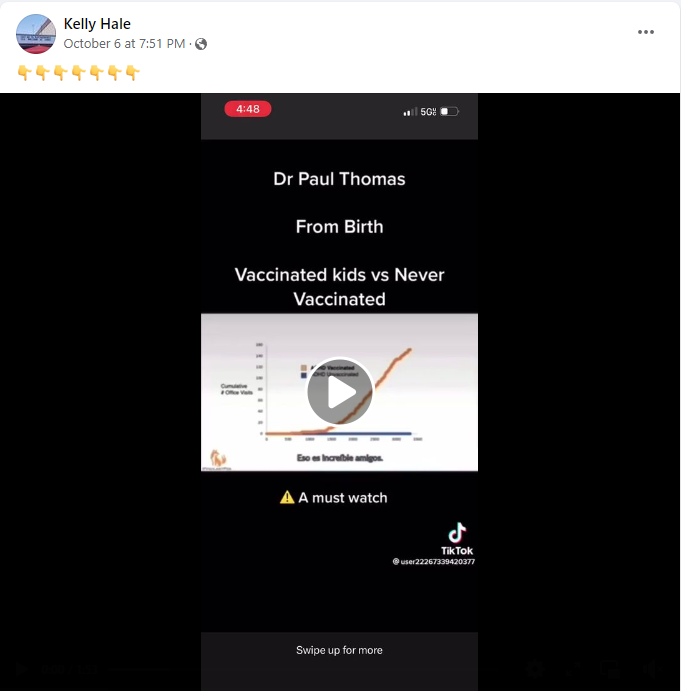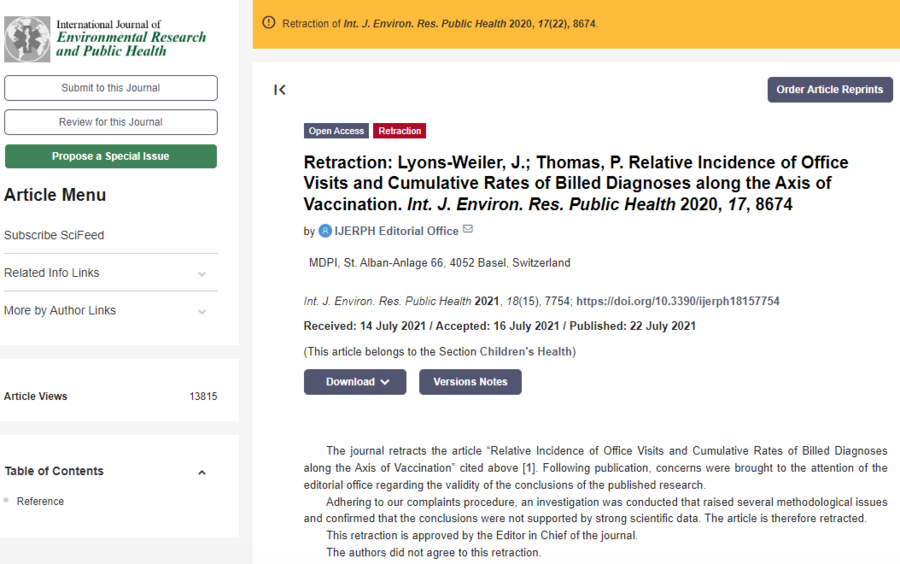
Does an article published in the International Journal of Environmental Research and Public Health and featured in a video on social media prove that vaccination causes a greater prevalence of childhood illnesses? No, that's not true: Journal editors retracted the study because its "conclusions were not supported by strong scientific data." Additionally, the consensus in the scientific and medical communities strongly supports the use of vaccines as a safe and effective way to prevent childhood illnesses and protect public health.
The claim appeared in a post and video (archived here) published on Facebook by Kelly Hale on October 6, 2023, under the title "Dr Paul Thomas -- From Birth -- Vaccinated kids vs Never Vaccinated." The post's caption included seven finger-pointing down emojis:
👇👇👇👇👇👇👇
This is what the post looked like on Facebook at the time of writing:
(Source: Facebook screenshot taken on Mon Oct 23 16:53:44 2023 UTC)
The study
The article, "Relative Incidence of Office Visits and Cumulative Rates of Billed Diagnoses Along the Axis of Vaccination," featured in the video was published (archived here) in the International Journal of Environmental Research and Public Health on November 22, 2020, before it was corrected (archived here) on January 22, 2021, and finally retracted (archived here) on July 22, 2021. Here's what the retraction said:
The journal retracts the article 'Relative Incidence of Office Visits and Cumulative Rates of Billed Diagnoses along the Axis of Vaccination' cited above. Following publication, concerns were brought to the attention of the editorial office regarding the validity of the conclusions of the published research.
Adhering to our complaints procedure, an investigation was conducted that raised several methodological issues and confirmed that the conclusions were not supported by strong scientific data. The article is therefore retracted.
This retraction is approved by the Editor in Chief of the journal.
The authors did not agree to this retraction.
This is what the journal's website looked like at the time of writing:
(Source: International Journal of Environmental Research and Public Health screenshot taken on Mon Oct 23 16:53:44 2023 UTC)
Centers for Disease Control and Prevention
The Centers for Disease Control and Prevention recommends vaccinations for people in all stages of life:
What are the risks and benefits of vaccination?
Vaccines can prevent infectious diseases that once killed or harmed many infants, children, and adults. Without vaccines, your child is at risk for getting seriously ill and suffering pain, disability, and even death from diseases like measles and whooping cough. The main risks associated with getting vaccines are side effects, which are almost always mild (redness and swelling at the injection site) and go away within a few days. Serious side effects after vaccination, such as a severe allergic reaction, are very rare and doctors and clinic staff are trained to deal with them. The disease-prevention benefits of getting vaccines are much greater than the possible side effects for almost all children. The only exceptions to this are cases in which a child has a serious chronic medical condition like cancer or a disease that weakens the immune system, or has had a severe allergic reaction to a previous vaccine dose.
Other Lead Stories fact checks of claims about vaccination can be found here.



















